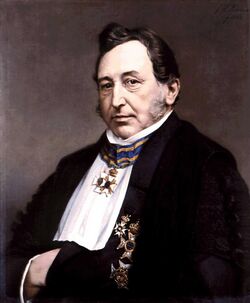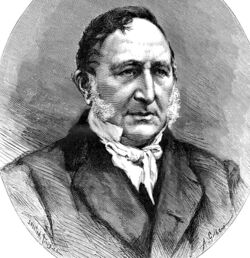Biography:Gerardus Johannes Mulder
Gerardus Johannes Mulder | |
|---|---|
 | |
| Born | 27 December 1802 Utrecht |
| Died | 18 April 1880 (aged 77) Bennekom |
| Alma mater | Utrecht University |
| Known for | Protein |
| Spouse(s) | Wilhelmina van Rossem (m. 1827) |
| Children | 6, including Eduard |
| Scientific career | |
| Fields | Chemistry |
| Institutions | Utrecht University |
| Thesis | Dissertatio medica de opio ejusque principiis, actione inter se comparatis (1825) |
| Doctoral advisor | Nicolaas Cornelis de Fremery |
| Doctoral students |
|
Gerardus Johannes Mulder or Gerrit Jan Mulder (27 December 1802 – 18 April 1880) was a Dutch organic and analytical chemist.
Life
Mulder was born in Utrecht and earned a medical degree from Utrecht University.[1]
He became a reader of chemistry in Rotterdam[2] and in 1840 he was appointed professor at Utrecht University.[1]
Protein
Following a suggestion by Jöns Jacob Berzelius, Mulder used the term protein in his 1838 paper, "On the composition of some animal substances" (originally in French but translated in 1839 to German). In the same publication, he also proposed that animals draw most of their protein from plants.[3][4][5]
Mulder "was the first to propose a theory concerning the causes of the differences between albumin, casein, and fibrin, and other substances more or less similar to them in physical properties and in their chemical behavior when exposed to reagents. Analyses of these substances showed that their percentage contribution with respect to carbon, hydrogen, nitrogen and oxygen were so similar as to suggest that they contain one common radical."[6] This radical, a macromolecule, had formula [math]\ce{ C20 H31 N5 O12 , }[/math] and was known as protein. The variations in albuminous substances were attributed to peripheral bonds of protein to sulfur and/or phosphorus. Justus Liebig and his students sought to determine the structure of proteins, but until the methods of Emil Fischer and Franz Hofmeister became available, the amino acid decompositions were unknown.[7]
Augustus Voelcker was Mulder's assistant for a year from 1846.[8][9]
In 1850, Mulder was elected a foreign member of the Royal Swedish Academy of Sciences. He died in Bennekom.
References
- ↑ 1.0 1.1 "Prof.dr. G.J. Mulder (1802–1880)" (in nl). Utrecht University. https://profs.library.uu.nl/index.php/profrec/getprofdata/1435/.
- ↑ Wels, C. B. (2013-11-12). "Biografisch Woordenboek van Nederland" (in nl). Biografisch Woordenboek van Nederland. The Hague. http://resources.huygens.knaw.nl/bwn1880-2000/lemmata/bwn2/mulder.
- ↑ Bulletin des Sciences Physiques et Naturelles en Néerlande (1838). pg 104. SUR LA COMPOSITION DE QUELQUES SUBSTANCES ANIMALES
- ↑ Hartley, Harold (1951). "Origin of the Word 'Protein.'". Nature 168 (4267): 244. doi:10.1038/168244a0. PMID 14875059. Bibcode: 1951Natur.168..244H.
- ↑ "Ueber die Zusammensetzung einiger thierischen Substanzen" (in de). Journal für Praktische Chemie 16: 129–152. 1838. doi:10.1002/prac.18390160137. https://zenodo.org/record/1427774.
- ↑ Elmer McCollum (1957) A History of Nutrition, chapter 4: Knowledge of Albuminous Substances, page 48 "The studies of Mulder on albuminous substances", Houghton-Mifflin
- ↑ Hubert Bradford Vickery (1942) "Liebig and the Proteins", Journal of Chemical Education doi:10.1021/ed019p73
- ↑ Clarke, Ernest (1899). "Voelcker, John Christopher Augustus". in Lee, Sidney. Dictionary of National Biography. 58. London: Smith, Elder & Co. doi:10.1093/odnb/9780192683120.013.28345.
- ↑ Goddard, Nicholas (2020-12-10). "Oxford Dictionary of National Biography" (in en). Oxford Dictionary of National Biography. Oxford University Press. doi:10.1093/ref:odnb/28345.
- Ihde, Aaron (1964) The Development of Modern Chemistry, Harper and Row, pages 359 and 423–424.
External links
- On the composition of some animal substances Translation of parts of Mulder's article from: Mikulás Teich, A Documentary History of Biochemistry, 1770-1940 (Rutherford, NJ: Fairleigh Dickinson University Press, 1992)
"Ueber die Zusammensetzung einiger thierischen Substanzen" (in de). Journal für Praktische Chemie 16: 129–152. 1839. doi:10.1002/prac.18390160137. https://zenodo.org/record/1427774.
 |


